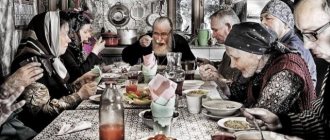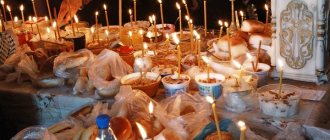A wake is a mandatory ritual rite, which includes prayer for the soul of the deceased, as well as a memorial meal, which is attended by all relatives, friends and acquaintances. Funerals are traditionally held on the 3rd day after death, 9th, 40th, and anniversaries. As a rule, relatives try to order a funeral dinner on strictly designated days, but sometimes it is not possible to carry out the ritual on time, and many people wonder whether the funeral can be held ahead of schedule or postponed to another day?
Funeral traditions among Christians
The calendar year, both in the world and in the church, is a time for taking stock. For a Christian, the anniversary of death is not only a day of grief for a loved one, but also a farewell to his soul into eternal life. By this point, the saving dulling of the initial, almost unbearable grief for man living on earth had already occurred. And the soul of the deceased finally got used to a purely spiritual existence and parted with traces of earthly worries.
For a believer, a churchgoer, the main thing in a wake is the opportunity to gather people who are ready to sincerely pray for the deceased. After all, his soul does not need a rich funeral dinner, especially with alcohol. A funeral meal for a Christian is an opportunity to help the soul of the departed with prayer and remember him with a kind word. At such a wake, the sadness of those gathered is light and significantly different from the atmosphere of hopeless grief that reigns at the wake of atheists. Even worse is the frequent transformation of wakes into a feast with copious libations.
Several years have passed: after 3 years or 5 years
Kutya is illuminated only in the first year.
After several years after the death of a loved one, commemoration in the temple and a visit (if possible) to the cemetery, where one can also serve a lithium, remain traditional. A memorial meal on subsequent anniversaries is not considered obligatory, since such commemoration does not carry a special religious load. But if the family decides to celebrate this date with dinner, then only close friends and relatives of the deceased are usually invited to it.
The funeral can be arranged at the discretion of the owners - either at home or in a cafe/dining room.
Such a meal is not an ordinary feast, so there are special dishes at it, the main one of which is the same kutia as at any other funeral. On the 2nd, 3rd anniversary and so on, kutya in the church does not need to be consecrated. The funeral table traditionally includes pancakes, compote or berry jelly, satiation (eve); cold appetizers - salads, vinaigrette, cold cuts; fish or meat dishes; borsch; various pies; sweets - candies, gingerbreads, gingerbreads, pies.
Commemorations on subsequent anniversaries are already devoid of the poignancy of loss, and the meal at its core represents a meeting of well-known people gathered around the table to remember the deceased with kind words.
In order not to ruin this atmosphere, it is worth remembering some rules.
- Reduce alcohol consumption to a minimum. Alcohol consumption should be kept to a minimum. It is no longer associated so much with the name of the deceased and the harm to his soul, but with a general meeting, but you still shouldn’t get carried away with drinking.
- You can't laugh or tell jokes. And even if there are stories about funny incidents from the life of the person commemorated, then you also need to respond to them adequately.
- Choral table singing is also inappropriate.
Be that as it may, when organizing memorial events for anniversaries, first of all you need to think not about how to feed the guests more deliciously and surprise them with an abundance of funeral dinner, but about what benefit it will bring to the soul of a deceased loved one. Many, not without reason, believe that the most necessary action is church prayer, and that large feasts can be dispensed with.
Basic rules for holding a funeral for 1 year
First of all, you need to order services at the church (see below) for the repose. The presence and prayer of the relatives themselves is highly desirable. After all, the priest is only the performer of the ritual and cannot put into it the feelings and emotions experienced by people close to the deceased.
When ordering a memorial service, it is customary to bring food with you and leave it on a special table in the church - bread, cereals, sugar, pasta, sunflower oil or butter, cookies, candies, fruits. After the service and blessing, they are distributed to those in need.
The donation of flour to the church bakery for baking prosphoras and the church - candles, incense, and lamp oil are welcomed.
Those who come to the wake wear discreet clothes in dark colors. Maintaining annual mourning for the deceased is not considered mandatory; it is the personal choice of the relative.
A photograph of the deceased, tied with black mourning ribbon, is placed in a prominent place in the room where the funeral is held.
What to cook for the anniversary memorial table
The funeral meal is considered a continuation of the church memorial service. It is not needed by the deceased, but by his family and friends who have returned from the cemetery and church service and are in need of restoration of strength. A funeral dinner with the following dishes on the menu is quite sufficient for this:
- borscht with meat;
- noodles with chicken or mushrooms;
- meat or fish main course;
- pies, pies or pancakes;
- salads, pickles;
- jelly, dried fruit compote, fruit drink or juices.
Relatives and friends of the deceased should not spend most of their energy and resources on organizing a memorial table. Particular attention should be paid to the issue of alcohol. It would be better if he was not at the funeral table at all. Its presence is permissible in limited quantities.
The only established Christian tradition is to prepare kutya and start the meal with it. This is the name of porridge made from whole grains of wheat, barley or rice with the addition of honey, sometimes nuts and dried fruits. Grain is the main component of the dish, symbolizing the eternal life of the soul and its rebirth in a revived body. As Jesus said[1], the grain that falls into the ground must die in order to be reborn to new life. And the sweetness of the porridge symbolizes the bliss of the righteous in heaven.
The following customs are quite common; strictly speaking, they have no Christian basis. A device for the deceased, a glass of water or a soft drink, is placed on the table, and a piece of black bread is placed on top of it. This symbolizes the farewell to the earth of the soul of the deceased.
If the year is celebrated during Lent, then the dishes served can be either lean or fast. The first option is appropriate in families that constantly observe fasting. If among the guests there are many people who are far from church traditions, then both lenten dishes and fast dishes are served.
The food left over after the funeral does not carry any negativity: it can be distributed to guests or the poor. If the arguments of Christians are not perceived by superstitious guests, then there is no point in arguing with them: a wake is not the best place for this.
How to host a funeral meal
The relatives of the deceased try to provide a hearty meal and prepare a wide variety of dishes.
Traditionally, lunch begins with eating kutya - porridge made from wheat or rice grains with the addition of raisins and honey, a couple of spoons of which everyone present should eat. The rest of the dishes are prepared to the taste and discretion of the owners. Most often this is:
- We are preparing a funeral menu. noodle soup or borscht,
- pies with potato or cabbage filling,
- meat dishes – casserole, sliced meat, rolls, cabbage rolls,
- fish dishes,
- cheeses.
This is a sample menu for non-fasting days. If the commemoration falls on days of fasting, meat dishes are replaced with mushrooms, beans, lentils in different culinary variations. As a dessert, you can offer charlotte or pancakes with jam/jam.
Before dinner begins, the eldest relative by age reads a prayer aloud and says words of memory about the deceased.
There are several strict rules for holding a memorial anniversary. So,
- It is inadmissible to remember the deceased with strong drinks;
- The following are strictly prohibited: showdowns, shouting, scandals, remembering the deceased with an unkind word;
It is quite appropriate to look at a family photo album or video, remembering pleasant moments and emotions associated with the life of the deceased.
What to say at a 1 year funeral
As a rule, many relatives and friends of the deceased gather for the hour. Naturally, among them there may well be people who are far from the faith. We must try to ensure that they do not determine the tone of the funeral meal. Especially if the person being remembered was a sincere believer. Atheists may not participate in prayer, but they must respect the feelings of those praying. Idle and loud conversations, and especially disputes, are completely inappropriate.
In addition to prayers, memorial words for the anniversary of death mainly refer to the good deeds of the deceased during earthly life.
Visit to the cemetery
After participating in a memorial service in church, Orthodox Christians usually visit the grave of the deceased. It is in keeping with Christian traditions to place an even number of fresh, rather than artificial, flowers on it. Real flowers symbolize the fact that God has everyone alive, and their even number represents the completion of earthly life.
Visiting the cemetery is overgrown with many superstitions that have no Christian basis:
- go to the cemetery exclusively in the first half of the day, supposedly to meet the souls of the dead, who are present there only at this time;
- do not enter the cemetery through the main gate through which the dead are transported: after all, they are also transported along the streets along which we never stop walking;
- fear of any objects from the cemetery: they are just objects;
- leaving food at the grave for the deceased: another thing is to address it to the poor with a request to pray for him;
- drink at the grave or pour vodka on it.
When and why is it remembered?
Funeral customs originate from biblical times. Even in the Old Testament there are indications that human prayers and good deeds can help the soul of the deceased ascend to heaven.
According to Christian traditions, memorials should be made:
- On the day of death or the next day, when the soul is separated from the body.
- After 3 days, which often coincides with the date of the funeral. All this time the spirit is present on earth, visiting its favorite places, trying to complete the work it has begun.
- On the 9th day, when a person appears before the creator. All 6 days before this, angels accompany the soul on a journey through paradise and show it heavenly blessings.
- On the 40th day, on which God makes the final decision where the spirit will live until the Last Judgment - in hell or heaven. This is preceded by a whole month of suffering and testing by sins. A person’s goal is to survive and prove that during his lifetime he has done more good than evil. Since the soul cannot beg for forgiveness on its own, relatives and close people must do this. Therefore, commemorations on this date are the most important for Orthodox Christians. They also symbolize the resurrection of Jesus Christ and his ascension, which occurred on the fortieth day after his death.
- Six months and a year after death. An anniversary is a worthy occasion to gather and remember the good deeds of the deceased. After all, as church tradition says, a person is alive as long as the memory of him is alive.
Is it possible to remember the deceased on an anniversary earlier or later?
It is recommended that all memorial events be held on the day of the death anniversary, and not before or after. It is especially undesirable to do this earlier: after all, a year ago on this day the person was still alive. A day later – it’s possible. It is permissible to hold a memorial service on weekends after the anniversary date that falls on a church holiday or Holy Week. But holding a meal later does not mean postponing other components of the wake - visiting and ordering prayer in church and giving alms.
Memorial Day
Each religion sets aside a specific date for the memorial day, when relatives or simply close people remember the deceased. If, due to urgent circumstances, it was not possible to honor the memory of loved ones who have died on the day of their death, this must be done on the memorial day.
- In the Orthodox faith, the Tuesday of the second week after Easter is set aside for the memorial day. However, this is not the only day when you can remember your loved ones. In addition to Radonitsa, there are five more days dedicated to the memory of the deceased;
- In the Catholic faith, the memorial day falls on November 2. Commemoration on the third, seventh and thirtieth days may not suit you;
- In the religion of Islam, the main task is to remember the deceased through prayer, to do good deeds on his behalf: to help orphans and poor people. In this religion, it does not matter at all on what day after the repose of the soul the memorial meal will be held. It is important that no one should know in whose name these acts are committed;
- In Buddhism, the day of obedience - the Ulambana holiday - falls on the first half of the seventh month according to the Lunar calendar.
What do they order in church on the anniversary of death?
Offering prayers to God is the duty of the living to the dead. Funeral prayers in church contribute to the remission of sins of the deceased and the peace of his soul. You can order a memorial during the following church services:
- liturgy;
- funeral services;
- lithium;
- psalms.
Liturgy
During the main Christian service, the deceased are mentioned three times - during the proskomedia, during the consecration of gifts and at the funeral litany.
Proskomedia, or offering, is the first stage of the liturgy, during which sacred actions are performed on bread and wine to prepare them for the sacrament of the Eucharist. The fifth prosphora (ritual bread) is funeral. During its consecration, the names of the deceased are read out. This also happens during the main part of the liturgy - the consecration of the Holy Gifts - and at the funeral litany.
Memorial service
This church service is most often ordered by relatives of the deceased. In addition to the church, it can be held by a priest in the house of the deceased or in a cemetery. We are talking about a church funeral service, which should not be confused with a civil one.
Lithium
This funeral service is shorter than a funeral service. Its obligatory attribute is cups with kutya near the canon (place for funeral candles) of the church. At the end of the litiya, the kutya is consecrated and distributed. This service can also be held at a cemetery, where a priest is invited.
Psalter
As you know, the psalter is a collection of psalms (hymns), most of which were written by the Jewish king David. The psalms are believed to have great spiritual power and help souls overcome demons. In addition to church, the reading of the psalter can be ordered to a priest at home.
The mentioning of the names of the deceased should be preceded by the transfer of notes to the priest with their names. Churches sell special books for such notes. Due to the large number of those commemorated, they do not always get their turn. In such cases, a relative participating in a church service can read a prayer for the repose of the soul of the deceased independently.
Strictly speaking, church services should be ordered for the repose of people who were baptized and churched in earthly life. Church funeral services for suicides are prohibited. These include those who died from a drug overdose. There is a special akathist for suicides, which their relatives can read.
[1] “Truly, truly, I say to you, unless a grain of wheat falls into the ground and dies, it remains alone; and if it dies, it will bear much fruit.” (John 12:24)
[2] “O God, the merciful Lord, remembering the anniversary of the death of Thy servant N (Thy servant N), we ask You to honor him (her) with a place in Thy Kingdom, grant blessed peace and bring him into the radiance of Thy glory. Lord, look mercifully on our prayers for the soul of Thy servant N (Thy servant N), whose anniversary of death we remember; We ask You to number him (her) among the host of Your saints, grant forgiveness of sins and eternal peace. Through Christ our Lord. Amen".
Recommendations from clergy
Everyone knows that people who have passed on to another world should be remembered, but people do not often understand for what purpose this should be done. Do not forget that there is a connection between the living and the dead. Therefore, after the death of a person, his loved ones are restless, there is anxiety and sadness in their souls, they often dream of the dead who ask for food or to provide them with some kind of help.
It is generally accepted that after such dreams a person should pray, visit a temple, and do some good deed (help the poor, orphans). All this beneficence has a good influence on the souls of the dead. If it is not possible to arrange a memorial service on the appointed day, do not be upset. You can leave a note for the clergyman, and he will conduct it himself.
The spiritual state of a person also influences the state of the deceased in the afterlife, in another world in order to help them. To do this, you should begin to change, first of all, yourself and the society around you. To begin with, it would be nice to free yourself from bad habits, forgive all your offenders, not bear grudges against them, start praying, visiting churches, reading the Bible, helping others and orphans.
During the commemoration, one should remember the purpose of a kind of ritual. When saying a general prayer, it is better to ask the Lord God to endow the deceased with the Kingdom of Heaven and give rest to his Soul.










